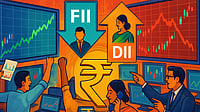
Platforms now directly liable for 18% GST on delivery fees; expected impact modest at ₹2–3/order.
MOFSL upgraded Swiggy, maintained buy on Zomato; forecasts 21–23% delivery growth through FY26–27.
Compliance tightening removes uncertainty, with growth story intact but margin management key.
India’s food-delivery majors are staring at fresh tax obligations after the Goods and Services Tax (GST) Council moved to bring local delivery services routed through online platforms under taxation. The 56th Council meeting clarified that platforms themselves and not individual delivery agents, will now be liable for the 18 percent GST applicable on delivery fees.
The change does not amount to a new levy as local delivery services were already taxed at 18 percent with input tax credit, but the notification aims to close a compliance gap. For years, platforms had argued that payments to unregistered gig workers fell outside GST rules, a stance that has triggered several high-profile disputes. Zomato last year received a demand notice of ₹803 crore for alleged unpaid taxes from 2019–2022, while Swiggy faced a ₹327 crore pre-demand notice.
Cost Impact Modest, But Pressure on Margins
Brokerages expect only a marginal direct hit from the tax changes. Morgan Stanley’s estimates suggests that Zomato could see a potential impact of about ₹2 per order, while Swiggy’s cost impact is pegged at ₹2.6 per order in FY25. Swiggy Instamart’s incremental burden is seen at under ₹1 per order. Analysts note that because delivery revenue was already taxed in most cases, the change formalises liability rather than adding significant new costs.
Even so, the timing appears to be on the wrong side for these delivery platforms as they are still working to balance growth with profitability targets across verticals, amidst a phase of rapid expansion. “We don’t see any new incremental impact on Blinkit as delivery fee was part of revenues and already attracting GST,” Morgan Stanley said in a note.
The market, however, appears unfazed. Motilal Oswal Financial Services upgraded Swiggy to a ‘buy’ with a target price of ₹560 per share, citing strong demand fundamentals. It maintained a ‘buy’ on Zomato (target ₹420 per share), projecting food-delivery growth of 21–23% between FY26 and FY27. The brokerage raised its valuation multiple for food delivery businesses to 35x FY27 adjusted Ebitda from 27x earlier, pinning it to ‘multiple tailwinds’ in consumption.
MOFSL added that profitability assumptions for quick commerce arms, Instamart and Blinkit, were also being brought forward, hinting towards improved operating leverage and scale gains.
For Zomato and Swiggy, the policy shift highlights the government’s growing focus on in India’s fast growing e-commerce sector, which is estimated to be among the fastest-expanding globally. The official stance removes uncertainty over liability but also raises the bar on compliance, at a time when investors are pushing for sustainable margins.
Now uncertainty remains over whether companies pass on the higher tax cost to customers or absorb it to preserve demand. A ₹2–3 per order hike is unlikely to materially dent consumption, but the optics of higher fees could test customer sensitivity in smaller towns, where platforms are banking on growth.
For now, analysts argue that the structural growth story remains intact. “Perfect storm has given way to multiple tailwinds,” MOFSL said, pointing to favourable demographics, rising frequency of online food orders, and improving monetisation levers.
































